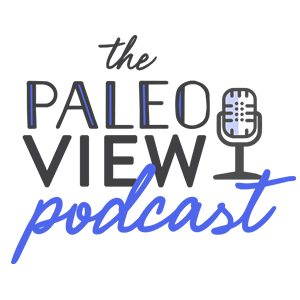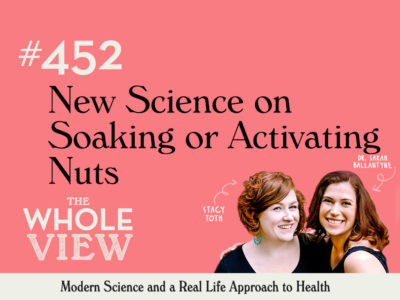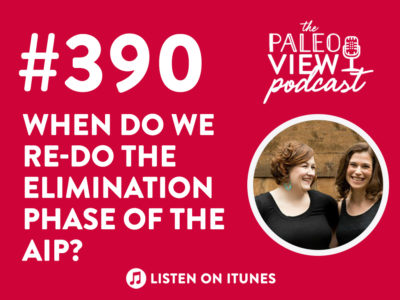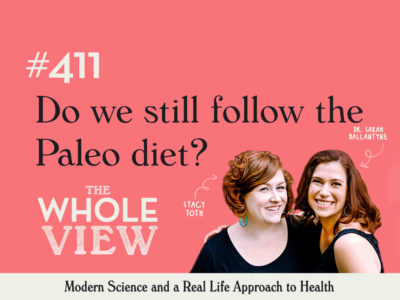On this episode of The Paleo View, Stacy and Sarah discuss the press release that was recently shared by the World Health Organization on processed and red meat consumption that has essentially created a meatpocolypse amongst all!
Click here to be taken to iTunes
or download and listen by clicking the PodBean Player below
![]()
If you enjoy the show, please review it in iTunes!
The Paleo View (TPV), Episode 167, Meatpocolypse
- Intro (0:00)
- News and Views (0:56)
- Stacy’s good news, the celebrity who shared Beyond Bacon in their cookbook collection
- Stacy’s bad news, an injury over the weekend
- The printing schedule with The Healing Kitchen, and how Sarah is managing her time and protecting her health despite a very stressful timeline
- The Thing (12:41)
- Monday morning of this week, the World Health Organization published a statement in The Lancet classifying red meat and processed meat as carcinogens
- A working group completed a literature review, and based on that review and a majority opinion, have decided to label processed meats as an international agency for research on cancer group 1 carcinogen, which means it is a confirmed carcinogenic to humans; and they have decided to label red meat as a group 2A carcinogen, meaning it is likely carcinogenic to humans
- They came up with these labels based on a majority, although not uniform; from studies linking high processed and red meat consumption with colorectal cancer
- Even in their statement they sort of say ‘despite the fact that this has never been confirmed or explained in animal studies’
- Basically the press release led the media stories to say that bacon will kill you, and essentially sparked a social media battle between vegetarians/vegans and meat lovers
- The reasons this has escalated into a very heated debate very quickly
- The statements that Stacy has seen from meat vendors
- The confusion that comes from all the various pieces of information in the media
- Sarah thinks that the information that the World Health Organization recommends tends to be on the money, which is why this statement caused such a to-do, because this is such a reputable organization making such a strong statement
- We expect the World Health Organization to be objective
- Sarah recommends that people check out her blog post from the summer on the link between meat consumption and cancer
- Sarah feels that the science on meat consumption shows that we need to come up with a more complete definition for carcinogenic
- There are really four mechanisms that are possible explanations on why processed and read meat consumption may cause cancer, and at least three out out of four of those explanations are missing the link between meat consumption and cancer when you are eating at least five servings of vegetables a day
- When we are talking about the meat and cancer link, all of the compounds in meat that have been linked to cancer are no different depending on how that meat is raised – so unfortunately they are in both conventional and grass-fed meat, which creates a different platform for the discussion
- The role that heme iron plays and the damage that it causes in the gut lining and cells
- What happens with heme when chlorophyll is present – displaying what happens when you have a side of broccoli next to your steak
- The cancer link doesn’t happen anymore when you consume vegetables with your meat, and so it starts to be that high meat diets don’t cause cancer – its start to be that high meat diets that are simultaneously low in vegetable content are creating an environment in which cancer is more likely to grow
- As soon as you add vegetables you are basically negating the high cancer risk of meat consumption, which you see in many scientific studies
- High vegetable consumption is linked to a lower risk of every chronic illness, with the ideal number of servings per day being five
- It is because of this information that Sarah feels you cannot uniformly say that meat causes cancer, because it is a very specific situation where meat is carcinogenic
- The conversation should not demonize meat, but instead open the door for a discussion about why it is important to have a balance of vegetables and protein on our plates and why it actually improves health and reduces the risk of this link to cancer
- Stacy finds that it is interesting that so much emphasis is being placed on processed meat, and that we need to take a step back and discuss what processed meat is and understand if/how the carcinogenic factor of the food is being altered
- There are so many beneficial things to meat that are never discussed
- Stacy feels that the information isn’t truly representative of what these leading organizations know to be true, which is really unfortunate because this has led to so much confusion
- Sarah feels like the opportunity to educate the general public is being completely missed, that we are trying to shortcut the science for the general public, assuming that they don’t want the resources and tools to make informed choices
- How can we expect to make any change without changing how we communicate health information, the rules approach does not work
- The choice in this situation isn’t don’t eat bacon, it is have some vegetables on the side
- We are constantly asking people to make these choices of deprivation, and the consequences this creates can be seen all around us
- We need to help people understand what to eat, not just what not to eat, and to explain why
- Stacy’s thoughts on all the ways you can get in your five servings – and don’t forget that most of the compounds in fruit are also equally beneficial
- When in doubt add more vegetables to your plate
- Stacy and Sarah will be back next week with a great topic!
- Old lady ways
- A reward for when Sarah finishes her book
- Thoughts on The Martian
- Carving out time to read for fun
- And remember, be careful what you read on the internet, that seems to be the common thing that we are learning
- Outro (53:42)









